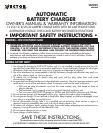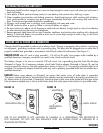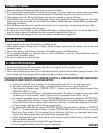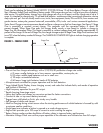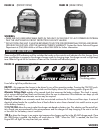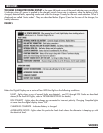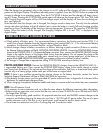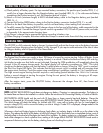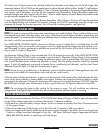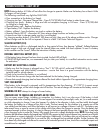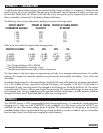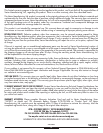
10
TROUBLESHOOTING - FAULT LED LIT
NOTE: Batteries below 4.0 Volts will not allow the charger to operate. Make sure the battery has at least 4 Volts
if charger will not charge.
The following conditions may light the FAULT LED:
• Poor connection to the battery (or frame).
• Charging too fast - Decrease Charge Rate - Press 2/10/20/40A Push button to select lower rate.
• Charging too slowly - Battery is large and did not complete charging in 24 hours - Press 2/10/20/40A
to charge at a faster rate.
• Shorted battery cell - Replace the battery.
• Open battery Cell - Replace the battery.
• Battery sulfated - have the battery serviced or replace the battery.
• Reverse Polarity LED LIT - disconnect AC then reverse clamp locations on battery and frame.
• Internal over-heat in charger-make sure fan is not blocked.
Tr y charging another battery, if the FAULT LED does not light, then one of the above problems exists. Charger
will not charge and the fan will not operate if there is a fault. Call Vector Technical Support.
SULFATED BATTERY (F03)
When batteries are left in a discharged state for a long period of time, they become "sulfated". Sulfated batteries
cannot accept a high rate of charge since the internal plates are coated with lead sulphate. To see if a battery
in this condition can be "saved", follow the instructions in battery restore
.
INTERNAL SHORT CELL BATTERY (F01)
• If the battery being charged has been short-circuited, the fault LED will light.
• If FAULT LED light comes on, we recommend that you take your battery to a certified automotive service center
for evaluation.
BATTERY NOT ACCEPTING A CHARGE
• Make sure that the charger is plugged into a "live" 110/120 volt AC outlet and POWER LED is lit
• Unplug charger and check battery connections - ensure that there is a good connection with the battery
terminal and/or vehicle chassis.
• Check to be sure that the battery is not sulfated.
• Check that the correct charge rate has been selected for the battery being charged.
•
Ensure that enough charging time has been allowed for-check table in Appendix A for approximate charging times.
VERY COLD BATTERY
If the battery to be charged is extremely cold (in temperatures less than freezing - 0º C/32º F) it cannot accept
a high rate of charge, so the initial charge rate will be slow. The rate of charge will increase as the
battery warms.
WARNING: DO NOT attempt to charge a frozen battery.
CHARGER FAILS TO CHARGE AND DISPLAYS AN F02 CODE:
This can mean several things, including no connection to a battery, but it can also occur if the battery is both
discharged and under a loading situation. This can happen if an accessory (dome light, radio, etc.) is on and remains
on while attempting to charge. It can also happen if a diode in the alternator is leaky and has totally discharged
the battery the battery to a voltage of less than 4 volts. The best remedy for this situation is to remove one of the
two cables from the battery and allow the battery to self recover to a voltage of above 4 volts DC. The battery may
take several hours or more to recover to this voltage which then allows the charger to operate. Once the battery has
recovered enough to allow charging, it is best to charge at the lowest possible charge rate. Even at that, it may take
a few charging cycles to make the battery fully recover from such a deeply discharges state.
NOTE:
Non-deep cycle
batteries that have been deeply discharged may NEVER fully recover to their original ampere hour capacity and should
be considered as suspect, especially in critical application. Additionally, if a battery does not self-recover to a voltage
of 4 volts or more, it is doubtful that it can ever be fully re-charged and considered reliable. Further, batteries that
have been fully discharged and allowed to remain so for extended periods of time, should be considered suspect and
reconditioned or replaced.
VEC093
A062003



